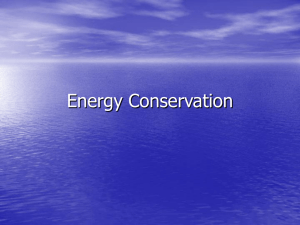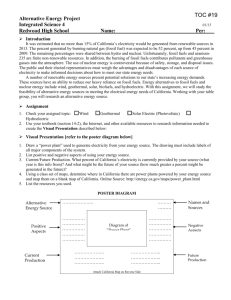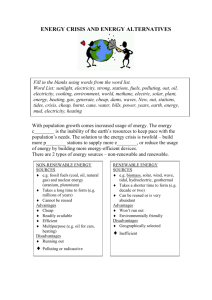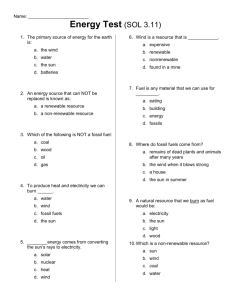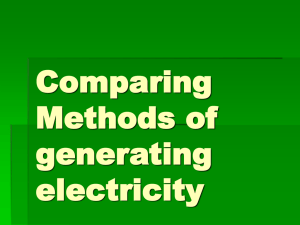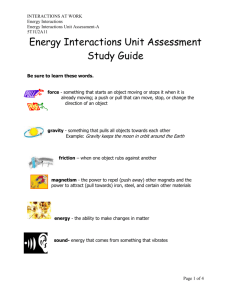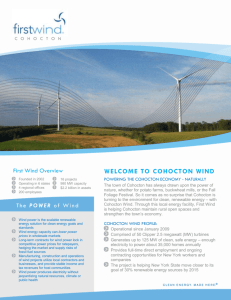generator - crypt
advertisement
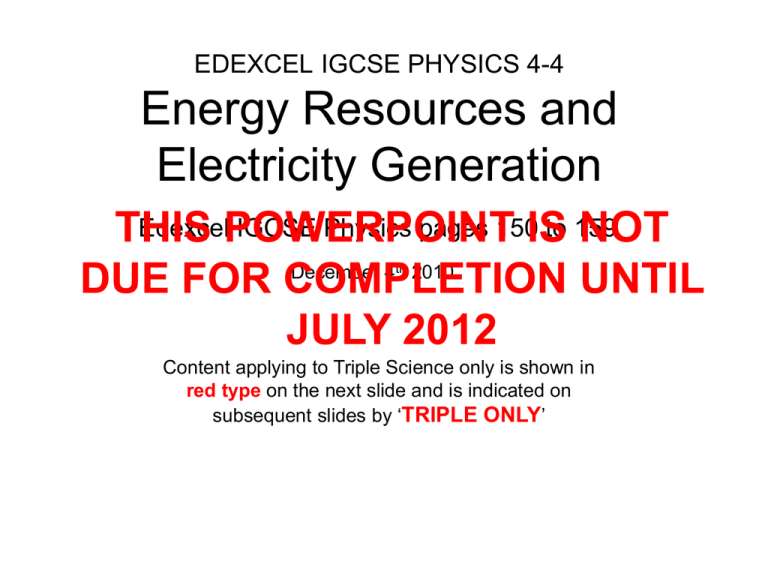
EDEXCEL IGCSE PHYSICS 4-4 Energy Resources and Electricity Generation EdexcelPOWERPOINT IGCSE Physics pages 150IS to 159 THIS NOT December 4 2010 DUE FOR COMPLETION UNTIL JULY 2012 th Content applying to Triple Science only is shown in red type on the next slide and is indicated on subsequent slides by ‘TRIPLE ONLY’ Edexcel IGCSE Specification Section 4: Energy resources and energy transfer d) Energy resources and electricity generation understand the energy transfers involved in generating electricity using: • wind • water • geothermal resources • solar heating systems • solar cells • fossil fuels • nuclear power describe the advantages and disadvantages of methods of large-scale electricity production from various renewable and non-renewable resources. Red type: Triple Science Only Thermal power stations A thermal power station generates electricity by using the heat produced by the burning a fossil fuel such as coal, gas, oil or by the fission of uranium. Over 90% of our electricity is produced by these type of power stations. Thermal power station block diagram BOILER TURBINES GENERATOR BOILER Fuel is burnt to turn water into high pressure steam. TURBINE High pressure steam turns a turbine (like a windmill) GENERATOR The turbine rotates the coils of a generator to produce electricity. Coal-fired power station A nuclear reactor Comparison of uranium and fossil fuels Energy released per kg of fuel Waste Greenhouse gases uranium coal, gas, oil 1 000 000 kWh 100 kWh radioactive waste that needs to be stored for many years non-radioactive waste None Yes, mostly carbon dioxide Choose appropriate words to fill in the gaps below: thermal Most of our electricity is produced by __________ power fuels stations. These use the _______ produced by burning _____ heat or the fission of __________ to generate electricity. uranium water The heat produced is used to change ________ into high turbine pressure steam. This steam is used to turn a _________ rotates which in turn _________ an electrical generator. 90% Over _______ of our electricity is generated by using thermal power stations. WORD SELECTION: rotates fuels turbine heat water 90% uranium thermal Simulations Power Station Animation - eChalk Generator - Fendt Nuclear Fission - Powerpoint presentation by Richard Miller of 5SJW (2005) Nuclear Fission - Powerpoint presentation that includes a link to the 'mousetrap' demonstration Nuclear Physics - PhET - Start a chain reaction, or introduce nonradioactive isotopes to prevent one. Watch alpha particles escape from a Polonium nucleus, causing radioactive alpha decay. Control energy production in a nuclear reactor! Chain reaction demonstration using mousetraps - University of Michigan BBC Bitesize Revision: Introduction Page on AQA Generating Electricity Test Bite on Generating Electricity BBC Bitesize Revision: Fossil Fuels Nuclear Fuels Comparing Sources - includes short and long term costs Test Bite on Generating Electricity Renewable energy sources A renewable energy resource is one that will not run out. Renewable energy sources do not produce radioactive waste, greenhouse gases or acid rain. Examples include wind, hydroelectric, wave, tidal, solar and geothermal. Fossil fuels such as coal. gas and oil as well as uranium are non-renewable energy sources. Wind power Wind is used to drive a turbine directly which rotates an electrical generator. A wind farm Wind power versus thermal power stations ADVANTAGES • Renewable energy source • No greenhouse gases • No acid rain • No radioactive waste • Inexpensive to build • Short start up time DISADVANTAGES • Unreliable – needs wind! • Best used in places where they will often be regarded as unsightly • Many turbines are needed to produce the same energy of a small thermal power station • Noise • Danger to wildlife Wave power Waves can be used to drive an electrical generator. Wave power versus thermal power stations ADVANTAGES • Renewable • No greenhouse gases • No acid rain • No radioactive waste • No land needed • Short start up time DISADVANTAGES • Unreliable • Can only be used in areas with suitable waves • Prone to storm damage • Many needed to produce the same energy of a small thermal power station • Danger to shipping Hydroelectric power Falling water is used to drive a turbine directly which rotates an electrical generator. The Hoover Dam near Las Vegas Hydroelectric power station Hydroelectric power versus thermal power stations ADVANTAGES • Renewable • Can produce as much energy as a thermal power station • No greenhouse gases • No acid rain • No radioactive waste • Short start up time DISADVANTAGES • Can only be used in mountainous areas • A large amount of land needs to be flooded • Expensive to build Tidal power Moving water caused by the tides is used to drive a turbine directly which rotates an electrical generator. Proposed Severn Estuary Tidal Power Scheme Tidal power station at La Rance, Brittany Tidal power station Tidal power versus thermal power stations ADVANTAGES • Renewable • No greenhouse gases • No acid rain • No radioactive waste • Short start up time DISADVANTAGES • Very limited locations • Wildlife affected • Expensive to build Simulations Wind Energy Wave, Tidal & HEP Solar power (cells) Electricity can be produced directly from the Sun’s radiation using solar cells. Solar power (panels) Solar panels are used to heat water saving electricity or gas use. Solar power versus thermal power stations ADVANTAGES • Renewable • No greenhouse gases • No acid rain • No radioactive waste • Short start up time DISADVANTAGES • Unreliable in the UK! – sunshine is needed for solar cells • Can only be used during the day • Only 10% of solar energy is converted into electricity by solar cells • Many cells needed to produce the same energy of a small thermal power station Geothermal energy In some volcanic areas hot water and steam rise to the surface. The steam can be tapped and used to drive turbines. This is known as geothermal energy. Geothermal versus thermal power stations ADVANTAGES • Renewable • No greenhouse gases • No acid rain • No radioactive waste • Short start up time DISADVANTAGES • Very limited locations • Expensive to build Electricity generation pie-chart Most of our electricity is generated by burning fossil fuels (74% according to the pie chart opposite) Nearly 20% is nuclear Less than 5% is currently generated using renewable sources. Problems with fossil fuels Burning coal, gas and oil produces carbon dioxide. This is a greenhouse gas which causes global warming. Fossil fuel burning can also produce sulfur dioxide gas. This can dissolve in water and produce acid rain which causes damage to forests and buildings. Modern power stations remove most sulfur dioxide producing compounds before burning. Fossil fuels are not renewable. They are running out. Estimates vary between 50 to 200 years to when we will need to find alternative sources of energy. An effect of acid rain Problems with nuclear power stations Nuclear fuel (uranium) does not produce greenhouse gases and it generates 10000 times more energy per kilogram than fossil fuels. However: Nuclear waste is radioactive and may have to be stored safely for thousands of years. Although safe in normal operation, accidents can release radioactive material over a large area. The area around Chernobyl in Ukraine has been closed off since 1986. The destroyed Chernobyl nuclear reactor Choose appropriate words to fill in the gaps below: run out and they do not Renewable energy sources will not _____ greenhouse gases, acid rain or radioactive waste. cause __________ electricity However, most of our ___________ is produced using nonfossil fuels (coal, gas and oil) renewable sources such as ______ uranium reliable and _________. These are highly concentrated and ________ energy sources. In the near future we hope to use more renewable sources tidal such as wind, wave and _______ power. This will help us to non-renewable conserve the remaining _______________ energy sources. WORD SELECTION: fossil non-renewable electricity greenhouse tidal reliable uranium run Energy Resources and Electricity Generation Notes questions from pages 150 to 159 1. Answer the questions on page 159. 2. Verify that you can do all of the items listed in the end of chapter checklist on page 159. Online Simulations
